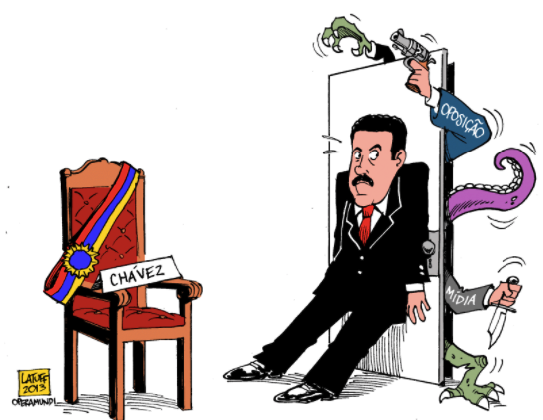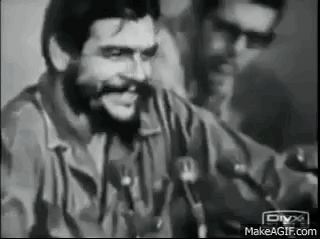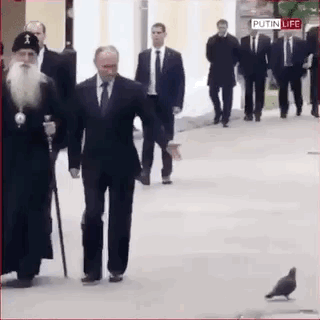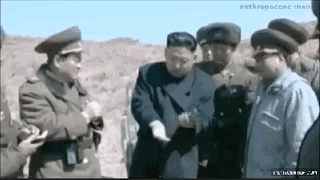Pablo the Miner and Superman. Everything you need to know about El Petro
Oil, protests, sanctions, rabbits, Russian involvement and Kim Jong-un. The most subjective story about Venezuelan cryptocurrency.
Disclaimer
Guys, we’re not CNN or BBC – congressmen don’t leak us information, we don’t use former KGB officers and don’t attend spiritual seances. So this column is an attempt to do some sensible analysis based on information from publicly available sources. But it should be a good read. Pinky promise.
Pablo the miner sits in a filthy prison cell and thinks about his mother and sisters. “What’s happened to them since I’ve been here? Have they found anything to eat? It’s my fault that I got caught by the military.” Pablo was on the verge of insanity. The torture by sleep deprivation lasted forever. Every attempt to fall asleep was interrupted by a powerful blow from the warden. And then it was over.
Pablo woke up in hospital. A short man in a formal suit was sitting next to him. “Obviously from the Party,” thought the boy. The guest told the miner that his family has been given enough food for a week. And in the future they will not have to starve either. If, of course, Pablo agrees to cooperate. The miner agreed – he was given back his equipment, had his personal details recorded and was released to go home. That’s how he became the 171st miner of the world’s first state-sponsored cryptocurrency, El Petro.
What’s Going On in Venezuela?


Hyperinflation has been raging in the country for years. The official exchange rate of the national currency, the Bolivar, is 11.6 cents, but in fact it is worth less than $0.00004 on the “black market”. As a result, the purchasing power of the Venezuelan population has dropped rapidly. President Maduro has prepared an unusual, to say the least, response. A chain of electronics stores was seized by the military and the goods were sold for 10% of their value. Price controls were introduced for basic groceries (bread, milk, eggs, etc.), after which the main vendors left the market and a food crisis began.
These processes, as well as the President’s desire to change the Constitution yet again, brought demonstrators onto the streets. Last year, nearly 200 protesters were killed in clashes with the military. The international community demanded that Maduro end the violence against civilians. Spain stopped deliveries of bulletproof vests, helmets, rubber bullets and gas. The US froze the accounts of high-level Venezuelan officials and banned food supplies to the country (Nicaragua obediently gave up on 5% of its exports).
Why Does Venezuela Need a Government Cryptocurrency?


Venezuela’s foreign debt exceeds $130 billion and at the moment it is not making any payments, as the country is a complete mess. At the same time, the state boasts the largest oil reserves in the world, ahead of countries like Saudi Arabia, UAE and Qatar. At the beginning of the 21st century, the median income per capita was the highest in Latin America.
Oil is a blessing and a curse for Venezuela. In economics, this phenomenon is known as Dutch Disease. This is when a state is 100% dependent on the extraction of certain natural resources and any reduction in their value hits it extremely hard. In Venezuela, oil put a stop to natural economic progress. While other countries were thinking up a multitude of ways to make money, all they did was produce the “black gold” and sell it. Half of oil exports, by the way, go to the United States.
President Maduro announced that the El Petro cryptocurrency is the kryptonite that will make it possible to defeat Superman (i.e. the USA). It will be backed by oil.
The government has allocated 5 billion barrels of oil for this purpose in the Ayacucho oil field of the Orinoco Belt. Each coin is attached to one barrel (now worth $69). This currency will be less volatile than others. El Petro Gold – a currency backed by gold – has also been announced.
Venezuelans have a positive attitude towards cryptocurrencies. When the country ran out of dollars, they started to invest their Bolivars in tokens. After all, even the deadest coin won’t fall off a cliff as fast as the local fiat currency does. Cheap electricity (there are many such social programmes in Venezuela, which the current government calls “21st century socialism”) has made mining a great way to earn money out of the ruins of the economy. Miners were caught, thrown in prison and accused of sabotage, but their numbers grew and grew. Then the country’s leadership finally realized that these resourceful guys are best used for their own purposes. Now mining is only permitted to people entered in a state register.
The authorities assert that the issue of a national cryptocurrency will help attract investment into the country and save it from disaster. The Bolivar could be forgotten like a bad dream.
Will Maduro’s Plan Work?


From the 1930s to the 70s, the GDP per capita of Venezuela was on the same level as Western European countries. Then world oil prices dropped, the oil industry was nationalised and presidents and regimes came and went until the socialists eventually came to power. Instead of developing infrastructure and technology, every year they piled masses of public money into the social sector. This, as we can see, ended badly.
Okay, you can finish off the dying Bolivar and replace it with some fresh cryptomoney, but that won’t change the government. Any attracted investments will be used just as stupidly as previous state budgets. In addition, the Venezuelan Parliament (which is in opposition to government, so no one pays any attention to it) believes that El Petro is not actually a cryptocurrency, but a forward contract for Venezuelan oil.
The El Petro whitepaper promised that the tokens will be issued on the Ethereum platform, but then it turned out that the NEM blockchain will be used. There have been other fuck-ups too. Pretty undignified for a state-backed coin, right?
Analysts at the Brookings Institution are convinced that El Petro will not only fail to help the Venezuelan economy, but also strike a blow against all cryptocurrencies, as people will lose confidence in them. And anyway, a state-backed coin looks pretty weird in the context of the decentralised blockchain revolution.
Whatever the case may be, Maduro has announced that the pre-sale was successful and almost 300,000 investors took part in it. 36% of transactions were in dollars, 15% in Euros, 18% in Ethereum and 31% in Bitcoin.
What Have the Russians Got to Do with It?


Time recently published an article talking about how Russia is secretly helping Venezuela to issue its cryptocurrency. Both countries are under severe economic sanctions and crypto is a great way to get around them. Venezuelan opposition leader Armando Armas thinks Russia understands that Maduro has nothing to lose, so has decided to conduct an experiment. If it works, we should expect a repeat performance in Moscow soon. Then Russia will be able to anonymously buy whatever it wants, whenever and wherever it wants it.
The publication drew attention to the presence of Russian businessmen Druzhkov and Bogorodsky at the El Petro presentation. Bogorodsky is considered to be Putin’s informal observer in Latin America. While Druzhkov has been linked with Renaissance painting collector Sergei Litvin, who, by the way, has also been hit with Western sanctions.
Donald Trump has imposed a ban on trading El Petro. It concerns all transactions with digital currencies, coins and tokens issued on behalf of the government of Venezuela for citizens and legal entities of the United States. Theoretically, the executive order could apply to BTC and ETH, as El Petro was sold for these currencies. Investing in these cryptocurrencies causes their growth, indirectly aiding Maduro’s regime. This also goes for the NEM platform – any exchange paired with the NEM (XEM) cryptocurrency may also contribute to the development of Venezuela’s economy.
What Does This Mean for the Rest of the World?


North Korea is often linked to cyber attacks around the world. Their main goal is to steal funds – recently, hackers have been attacking cryptocurrency exchanges and wallets. It is believed that Kim Jong-un has already accumulated quite a few Bitcoins. What if the next step of the country of Juche is a national cryptocurrency? Which, backed by the likely digital assets of the local authorities, could skyrocket. Thanks to blockchain, the Koreans will be able to bypass any sanctions and buy all the missing parts for their rockets and bombs. But seriously, if Russia is missing Italian cheese and French wine because of sanctions, but will be able to buy them for cryptoroubles, even Steven King won’t be able to predict Kim Jong-un’s desires. Maybe Dennis Rodman will though 😀
It’s no coincidence that state-backed cryptocurrencies are springing up in fanatical states, because the idea of blockchain itself became popular thanks to faithful enthusiasts. But if this goes any further, the elite countries that consider themselves referees in the international game of thrones will start to crack down. Which is not at all cool for our cosy crypto community.
Instead of a Conclusion
When Pedro the miner returned home, the sun was shining brightly and his mother was taking his sisters to school. They burst into tears of joy, because they didn’t expect to see him alive again. When everything calmed down, the young man noticed a rabbit cage and asked where it came from. His mother replied that the authorities have given orders to fight hunger through mass animal breeding. But they’ve become so attached to the rabbit that they’re not going to breed it, never mind eat it. The end.
P.S. The Bitfinex exchange has already announced that it will not cooperate with El Petro. They’re obviously afraid of getting in trouble with the American authorities. But will everyone be so compliant?





